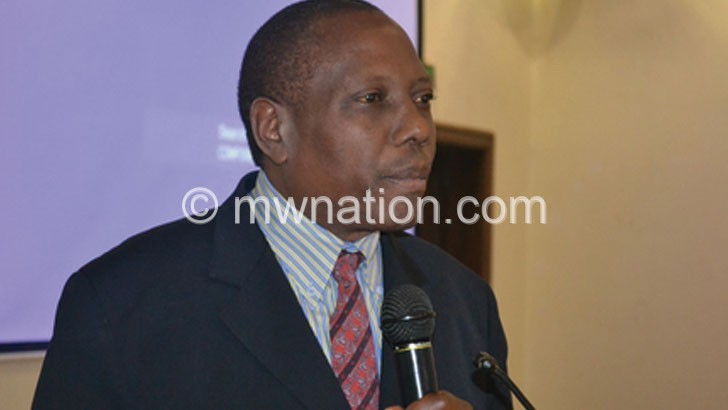Power outages cripple Firms
- Output is down—MCCCI
- Companies producing at 40 to 80% of optimal capacity
Prolonged power outages the country is currently experiencing are having a knock-on effect on the private sector and forcing some companies to produce at between 40 and 80 percent of their optimal capacity.

The development is pushing firms to spend more than their budgets to run machines using heavy generators, industry captains have said.
Malawi Confederation of Chambers of Commerce and Industry (MCCCI) president Karl Chokhotho said in an interview with Weekend Nation that reduced production means reduced products for sale, which translates into reduced turnover.
Said Chokhotho: “Reduced production with the same fixed costs and reduced revenues have driven some companies to restructure and scale down on staff, and some to relocate. This is worrying and a serious issue that needs addressing urgently.”
“For the manufacturing sector, it is critical to have power. Alternative power sources are far more expensive and not sustainable over long periods thus raising fixed costs and ultimately some have still downsized. This includes small businesses with smaller margins who are suffering more,” he said.

He said as a country, Malawi needs to rise and urgently seize all available resources and move toward removing this obstacle to doing business because it is for the nation’s good.
At the peak of the crisis, some manufacturing companies have disclosed to Weekend Nation that electricity has constantly been the top obstacle to doing business in Malawi.
One such company is Nampak Malawi Limited, manufacturers of paper and board packaging. The company’s managing director, Symon Itaye, in a telephone interview on Tuesday said at the moment the company is struggling with production costs due to prolonged power outages.
He said the situation has left the company with no choice, but to bring in an alternative power source, but still cannot meet their capacity.
“In the thick of things, we bought a generator, but its capacity is 400 kva [kilovolt-ampere] against our demand which hovers at around 600 kva. We are using about 1 000 litres of diesel per day to power this generator, which is just too expensive,” he said.

Itaye, however, applauded Electricity Supply Corporation of Malawi (Escom) for sticking to and making its load shedding programme, public saying this has helped the company plan to around the programme.
“We have managed to reshuffle our shifts according to the load shedding programme which Escom made available to us,” he said.
Another industry source with an insight of the manufacturing industry also confided to Weekend Nation through an emailed questionnaire on Thursday that some manufacturing companies have on given days halted completely their operations because they cannot run without power which has led to loss of production.
She said computerised sales systems for most big companies are also affected, resulting in lower sales, adding that power outages are also compromising quality for sensitive ingredients which are supposed to be kept under very low temperatures.
“As an alternative, some are using standby generators just for administration and other operations that do not require high power as it is not possible to run any production using the generator power because of the low capacity for generators.”
She concurred with Itaye that running a genset is very costly and not sustainable due to high costs of diesel.
“This also puts at risk factory workers, especially those on a temporary basis as they are paid on a daily basis and stay idle when there is no power and no production,” she said.
She said fast moving consumer goods businesses are also feeling the pinch of the situation as time is paramount for such businesses.
She said: “For these businesses, loss of production time means failing to supply some orders to customers. This, automatically, slows down the overall growth of the business, increases the cost of manufacturing resulting in low gross and net margins for the industry.”
Weighing in on the issue Chancellor College-based economics professor Ben Kaluwa described the current rate of blackouts as having a huge adverse effect on the country’s quest for economic growth.
Said Kaluwa: “It is so disheartening to see that there is usually no power to run production. For an economy to grow, power is very critical and the current situation has affected businesses at all levels.
“In the manufacturing industry, some processes are irreversible, meaning that if there is a power interruption everything will be put to waste. That is why companies choose to suspend production. But even those small businesses are equally affected to the extent that small entrepreneurs have had their very life lines cut.”
According to the Economic Intelligence Unit (EUI), Malawi economy is poorly diversified and vulnerable to both internal and external shocks.
As a result the EUI in January projected Malawi’s gross domestic product (GDP) to be subdued this year at 3.6 percent from 3.1 percent last year while the World Bank projected growth to around 2.6 percent.
Surprisingly, Minister of Finance and Economic Planning Goodall Gondwe in his 2016/17 Budget Statement projected growth to hit 5.1 percent.
But an expert yesterday warned that with persistent power blackouts this growth rate projection might not be achieved.
Load shedding
Escom announced two weeks ago the water flow in the Shire River only allows it to produce up to 200 Megawatts (MW) against a maximum generation capacity of 351.75MW topped up by a 10MW diesel-powered plant installed in Lilongwe, necessitating load shedding of 140 MW. It said plans are underway to diversify into solar, thermal, diesel, and gas to ensure sustainable electricity generation in the long run.
Escom said the present water level in Lake Malawi is the lowest compared to the past 10 years, which has adversely affected the flow of water in the Shire River and, therefore, hydro electricity generation at the power generation stations.
The company’s acting public relations manager George Mituka said in an interview on Thursday last week there are plans to diversify into solar, thermal, diesel, and gas to ensure sustainable electricity generation in the long run.
The power utility firm also suggested that, among other interventions, consumers should start using energy saver bulbs. It also mentioned of dredging at power stations, load shedding, avoidance of usage of electricity by domestic, commercial and industrial users at the same time as it plans to import power from Mozambique and Zambia.
Coal as a source of energy
But a senior lecturer in environmental sciences at the Polytechnic, a constituent college of the University of Malawi, Chikumbusko Kaonga, who described the current situation as warning signs of an impending major crisis, said Malawi needs to diversify further.
Kaonga said Malawi stands on a dangerous path due to climatic factors that continue to threaten the availability of enough water for electricity generation.
“Malawi needs to diversify its power sources further. Hydro-electricity in our country relies on Shire River and we have been having problems each year. Although it looks as if it is impossible [for the Shire River or Lake Malawi to dry up], however both of them can dry up. In actual fact, there is a record that in the early 1900s, the Shire stopped flowing for close to 18 years before it resumed flowing. At the rate which the environment is being destroyed, there is a realistic chance for that happening again.
“We need to have alternative sources of energy. Apart from solar energy, we should seriously start thinking about generating electricity from coal. We have coal in Malawi. That should make it possible for us to generate electricity from this source.
“We can also supplement on hydro-electricity by allowing people or organisations to be able to generate electricity from the falls on a number of rivers that we have. The government can easily work out how exactly this can be done such as giving licences to people and organisations to operate at a fee,” he said.





